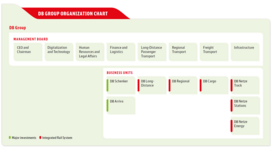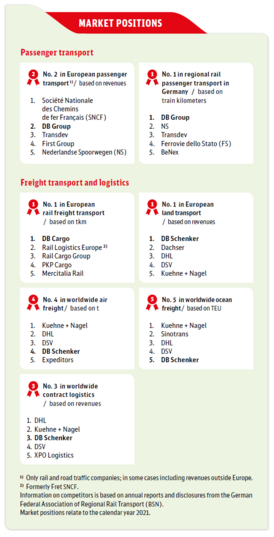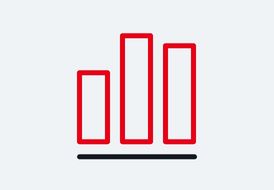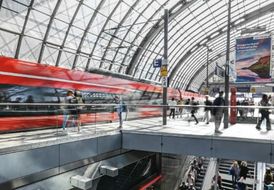
DB Group is a leading provider in the mobility and logistics sector, and primarily consists of the Integrated Rail System and the two major international subsidiaries DB Schenker and DB Arriva. The Integrated Rail System includes our passenger transport activities in Germany, our rail freight transport activities, the operating service units, and the rail infrastructure companies. DB Group, with its head office in Berlin, employs around 340,000 employees. Its business operations are focused on rail transport in Germany.
Our primary concern is the shift from road traffic to climate-friendly rail. To this end, we rely on integrated operation of transport and rail infrastructure, the economically and environmentally intelligent linkage of all modes of transport, as well as cooperation in German and European networks. At about 33,000 km, our rail network in Germany is Europe’s longest. We are also one of the largest energy suppliers in Germany.

Our national and international services give us leading market positions in our relevant markets.
DB AG is the parent company of the DB Group. It has been a stock corporation under German law since it was founded in 1994 and accordingly has a dual management and control structure comprising a Management Board and a Supervisory Board. It is wholly owned by the Federal Republic of Germany. The changes in the composition of the Supervisory Board and the Management Board are presented in the Supervisory Board report.
In the DB Group, DB AG runs all business units as an operating management holding company and supports the business units through various central group functions (including legal, corporate development, corporate balance sheets, taxes and insurance as well as finance and treasury) as well as administrative service units. In addition, operational service units as legally independent DB AG subsidiaries primarily provide services for internal customers. These include DB Systel GmbH, DB Sicherheit GmbH, DB Services GmbH and DB Kommunikationstechnik GmbH.
DB Group train operating companies are legally independent companies with separate balance sheets and statements of income, and thus fulfill all unbundling requirements under European and national law. There is also a functional unbundling, which guarantees the independence of decisions by DB Netz AG in relation to infrastructure access and fees. Reliability and stability form the basis of a high-quality infrastructure. The essential cornerstones for profitable business are sustainable financing of the existing infrastructure and its necessary expansion. The Performance and Financing Agreement (LuFV) makes a significant contribution to ensuring the maintenance of the existing network.
With its Strong Rail strategy, DB Group focuses on the business operations of the Integrated Rail System. As a prerequisite for the further shift in the mode of transport towards rail, the highest priority is to increase operating quality with a view to increasing capacity. To achieve these objectives, the coalition agreement of the Federal Government stipulates, among other things, that the infrastructure companies DB Netz AG and DB Station&Service AG within DB Group be merged into a new infrastructure division focusing on the common good.
Given the importance of Strong Rail for Europe, Europe will continue to be the main sphere of activity for DB Group in the future. Major international investments are measured by their contribution to Strong Rail:
-
Strategically relevant subsidiaries such as DB Schenker are therefore held as financial investments. Joint operational initiatives focus on achieving synergies within the network. In late-2022, the Supervisory Board instructed the Management Board to examine sales options for DB Schenker.
-
DB Arriva only accounts for a small amount of operational and strategic added value in Strong Rail. The intention to sell remains unchanged.


